Great Britain
About Andrew Cusack
 Writer, web designer, etc.; born in New York; educated in Argentina, Scotland, and South Africa; now based in London.
Writer, web designer, etc.; born in New York; educated in Argentina, Scotland, and South Africa; now based in London. read more
News
Blogs
Reviews & Periodicals
Arts & Design
World
France
Mitteleuropa
Knickerbockers
Argentina
The Levant
Africa
Cape of Good Hope
Netherlands
Scandinavia
Québec
India
Muscovy
Germany
Academica
Scotland in Snowfall
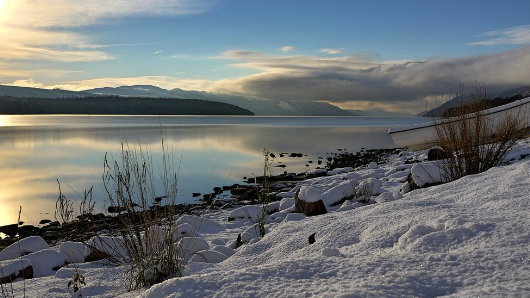
Scotland has been enveloped in snowfall, and the BBC has put a photo gallery up of reader-submitted images of the recent precipitation. The In Pictures feature of BBC News Online’s Scottish section has for years been one of my favourite parts of the website, offering a new series of photographs every week varying from the startling to the quotidian. Above is Michael Rennie’s view of a rather peaceful-looking Loch Ness. (more…)
The Spott Estate, Dunbar
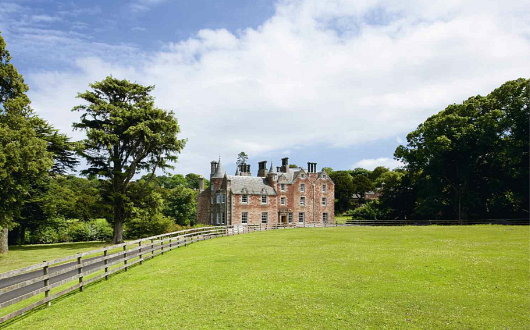
HERE IS A lordly demesne! In East Lothian, thirty-one miles from the centre of Edinburgh and three from the Royal Burgh of Dunbar, sits the Spott House and estate, now on the market from Knight Frank. The property is a whopping 2,463 acres in total, including 1,779 acres of arable land, 214 of pasture, and 356 acres of woodland. The estate has more than quadrupled in size in the past decade, under the ownership of the Danish-born Lars Foghsgaard, who bought just 600 acres in the year 2000.
As The Times wrote of Mr. Foghsgaard, “Clad in tweed jacket, plus fours and Hunter wellingtons, with several brace of partridge in his hand and his labrador at his side, he looks the very image of the country gentleman as he strides though his East Lothian estate.”
“The previous owner was very involved in the land,” Mr. Foghsgaard told the Times. “I am not a farmer, so I employed a farm manager: it’s crucial to have the necessary skills and connections in the area to do the job well, and as a foreigner I did not have those.” But the Dane does enjoy seeing the workings of the farm. “When I walk the dog, I always pass through the cowshed, where we have lambs being born each day — it’s such a joy to see.” (more…)
The Situation at St Andrews
Or: A Lesson in Corroborating Your Sources
AS IF, WITH THE recent announcement that a certain St Andrean couple are getting engaged, there wasn’t enough for us to expend our idle chatter about, the University of St Andrews is thrust into the fore on an entirely separate matter. Damian Thompson, the provocative and informative Catholic Herald editor and indispensable Daily Telegraph blogger wrote a blog entry — Catholic students at St Andrews ‘can’t have the Latin Mass’ — relaying the claims of a student that he and a stable group of students have asked to have a monthly Mass in the Extraordinary Form, found a priest willing to say it, and have been denied. Fr. Z, the world’s most famous clerical blogger, soon picked up the story as well and made a few comments of his own.
The reality of the situation, it appears, is far removed from the one student’s claims. (more…)
Remembrance 2010
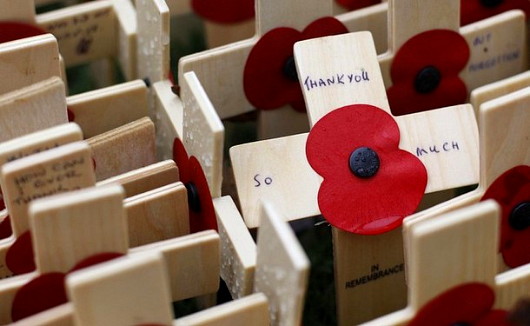
IN A WORLD utterly deprived of solemnity, Remembrance Day (and Remembrance Sunday) provides one of the few opportunities for silence, reflection, and appreciation. The First World War was truly a war without victory, the war that Europe lost. Its end is marked not with marching bands proclaiming triumph but with two minutes’ silence. How appropriate that the guns of the Great War finally fell silent on Martinmas day, the feast of the patron saint of soldiers, in this gloomy time of year. On this day there is no triumph nor victory, no vain pomp and glory of this world, but instead a deep respect for the awesome sacrifice of the fallen — a respect whose only expression can be found in that silence. (more…)
The Festival of Remembrance
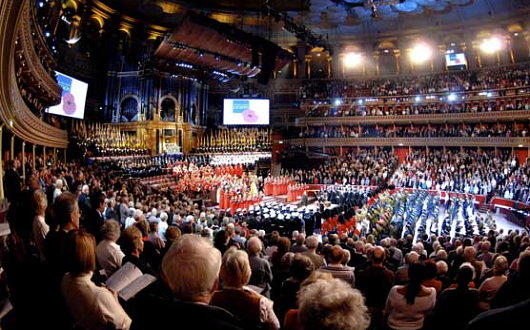
The Royal British Legion, the organisation which supports Britain’s veterans, organises the annual Festival of Remembrance at the Royal Albert Hall in London. The first half of the event is part military tattoo, part popular concert, but the second half is a Christian service of remembrance for the dead of all wars. The Festival takes place the Saturday before Remembrance Sunday: a 2:00pm matinee for the general public, and a 7:00pm one for veterans, servicemen, and their families in the presence of the Royal Family. The 7:00pm festival is broadcast on BBC1 every year, but sadly is not yet simulcast via internet for those abroad. Here are a few YouTube clips from different parts of the service in the past two years. (more…)
Antipopes We Have Known
The University of St Andrews is commencing the celebrations of its 600th anniversary, as the institution was founded in stages between 1410, when teaching started, and 1413, when a bull was issued recognising it as a university by Pedro de Luna, an antipope who styled himself Benedict XIII. Yesterday I attended a fascinating lecture by Dr. John Rao — From the Triple Papacy to the Council of Constance — as part of the 2010–2011 lecture series organised by the Roman Forum.
Boy was Benedict a baddie! Even the council he called passed resolutions condemning him and the cardinals he appointed turned against him. He ended his days maintaining his schismatic claim, holed in island fortress of Peñiscola. The day before he died, he appointed four cardinals, who elected de Luna’s friend Gil Sanchez Muñoz y Carbón as Clement VIII. Or rather, three of the cardinals did while the fourth — Jean Carrier, the archdeacon of Rodez — wasn’t present, so he went and single-handedly elected his sacristan Bernard Garnier as pope, who took the name Benedict XIV.
Garnier was permanently in hiding, and his location was only ever known to Carrier. B-14 did manage to choose four cardinals of his own, and on the antipope’s death they elected Carrier pope, who was inconveniently captured and imprisoned by his rival antipope, Clement VIII. Oddly, having just succeeded the supposed Benedict XIV, Carrier chose to use the name and style Benedict XIV also. A novel by Jean Raspail (L’Anneau du pêcheur) depicts a line of anti-papal successors to the two Benedict XIVs.
As a lecturer, Dr. Rao is both informative and entertaining, and I’d encourage anyone interested to attend the remaining lectures in this year’s series. There’s always wine on offers and little things to nibble on, with a box for generous donations to be made towards the cost of the program. The next lecture is Martin V and the Troubled Return to Rome — this week is the 593rd anniversary of that pope’s election, as it happens.
Also, Dr. David Allen White, retired Professor of World Literature at the United States Naval Academy, returns to New York in December for the Syllabus of Errors Weekend, on the subject of Charles Dickens and the Evils of Modernity. I went to last year’s Syllabus of Errors weekend, and Professor White is entrancingly engaging, a veritable font of knowledge.
Windsor
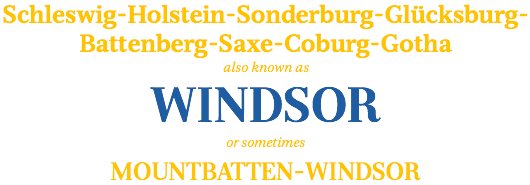
The word conjures up majestic imagery: Windsor — the castle viewed from the Long Walk and the Royal Standard snapping above the Round Tower. At the same time, it has a strange tinge of domesticity to it, an almost middle-class quality. Perhaps a 1950s development of semi-detached suburban houses along a ‘Windsor Drive’. What on earth does the word mean? (more…)
Preservation is Not Enough
A Proposal for Enhancement
IT IS COMMONLY said of St Andrews that it is a place of beauty. This is often a compliment to its natural setting, with open skies arcing over the reaches of the bay, and ancient rock and cliff yielding to the changing rhythms of the waves. At the same time visitors are generally struck by the pleasing combination of natural and built environments: the ruined grandeur of the Cathedral and Priory standing bare to the elements; crowstep-gabled cottages gathered in against the wind; the broad thoroughfares interlinked with narrow cobbled lanes; and the church towers etched against the sky. There is also the scholarly dignity of Deans Court, the quizzical posture of the Roundel, the charm of the courtyards to the south of South Street, the sad ruination of Blackfriars juxtaposed with the aspiring frontage of Madras College, and other evocative sights besides.
Here and there within the midst of all of this stands, physically, historically, and socially, the University. Its contributions to the architectural distinction of the old town are obvious enough. They are, principally, the harmonious South Street complex of St Mary’s College (1593-41) to the west, Parliament Hall (1612-43) to the north, and the Library extension (1889-1959) – now the Psychology wing – to the east; and the North Street set of the Collegiate Church of St Salvator, Gate Tower and tenement (1450-60), and beyond it the west block (1683-90) containing the Hebdomadar’s Room, and to the east and north the College buildings (1829-31 and 1845-6, respectively). There are other smaller and oft-reworked jewels associated within the University: St John’s House in South Street (15th, 17th, 18th, 19th, and 20th centuries), St Leonard’s Chapel (remodelled c. 1512), and the ‘Admirable Crichton’s House’ (16th century), but the principal architectural benefactions of the University to the town are the North and South Street college complexes. I have not mentioned the Younger Graduation Hall (1923-9) and the Student Union (1972) and prefer to leave it for readers to determine what might be said of these.
It could hardly have passed unnoticed that the list of contributions dates mostly from the late middle-ages to the nineteenth century, and this fact raises two questions: first, whether in the second half of the twentieth century the University was sufficiently attentive to its role as principal architectural patron; and second, how it might now hope to enhance the built environment of St Andrews. (more…)
The Daisy Wheel
Among the most well-known works of modern Scottish design, besides the ‘Clootie Dumpling’ of the Scottish National Party, there is the logo of the Royal Bank of Scotland: the Daisy Wheel. Now one of the most well-known financial brands in the world, the Royal Bank of Scotland was founded in Edinburgh in 1727, thirty-two years after its rival, the Bank of Scotland. (The Bank of Scotland, as it happens, was founded by an Englishman, John Holland — just as the Bank of England was founded by a Scot, Sir William Paterson).
The Scottish Parliament had declared in 1689 that King James VII had, by his absence, forfeited the throne, and handed the Crown to his Dutch rival William of Orange, who had already seized the throne in England. The House of Hanover succeeded to the throne of the new United Kingdom which had been created in 1707, but the Bank of Scotland was suspected of harbouring Jacobite sympathies. The London government was keen to help out Scottish merchants loyal to the Hanoverians and so, in 1727, King George granted a royal charter to the new Royal Bank of Scotland. (more…)
The East Neuk of Fife
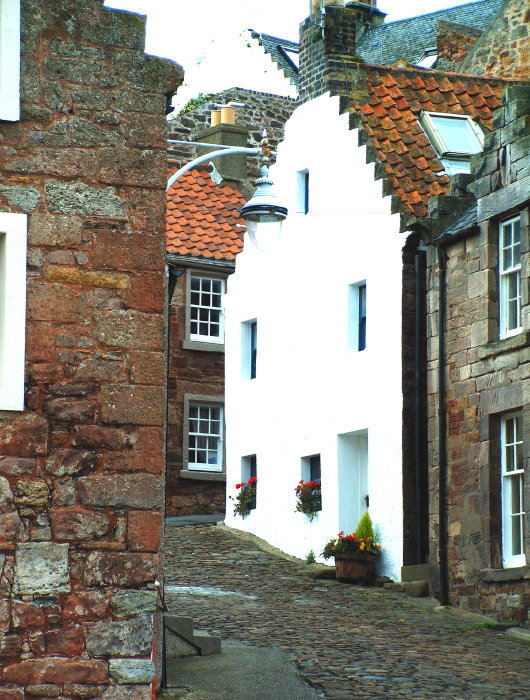
THE 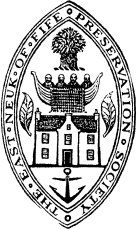 EAST NEUK of Fife is one of my favourite little corners of the globe, in what is definitely my favourite country in the world. Here are a set of almost unspoilt little fishing villages with a quite localised architectural style that makes them instantly recognisable. The name of this little regionlet signifies its location as the east ‘nook’ of the Kingdom of Fife, that juts out into the North Sea.
EAST NEUK of Fife is one of my favourite little corners of the globe, in what is definitely my favourite country in the world. Here are a set of almost unspoilt little fishing villages with a quite localised architectural style that makes them instantly recognisable. The name of this little regionlet signifies its location as the east ‘nook’ of the Kingdom of Fife, that juts out into the North Sea.
Those concerned for this part of the world might be interested in signing up for the East Neuk of Fife Preservation Society, which has completed admirable work all over the East Neuk, and is currently considering the restoration of the gatehouse of Pittenweem Priory.
Interesting Things Elsewhere
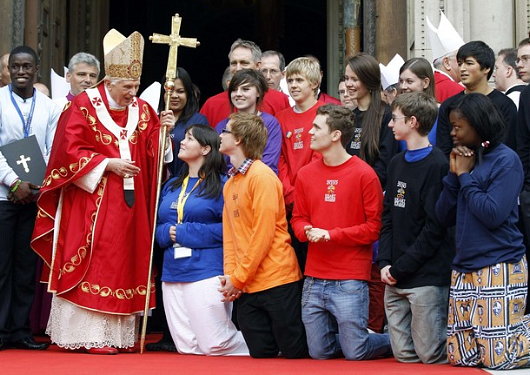
Benedict and Britain
The papal visit began in Scotland, and the smaller setting (Scotland has just five million people, fewer than London alone) proved a wiser starting point of the pontiff’s trip to Great Britain. “Would the first day have been the success it was if it had taken place in England?” asked William Oddie. “Would the papal chemistry have worked so soon in London, that vast and engulfing megalopolis, if the reception by Her Majesty had taken place in the impersonal splendours of Buckingham palace rather than in that ancient architectural wonder Holyrood house (whose very stones are a testimony to its Catholic origins) and if the Popemobile ride through the streets afterwards had been down the Mall?”
Damian Thompson has argued that the papal visit has proved a triumph for Benedict and a humiliation for the secular-humanist crowd. The Daily Telegraph blogs editor and Catholic Herald editor-in-chief says that the Pope’s natural shyness has worked to his advantage, while the former Spectator editor Dominic Lawson argued in the Independent that Benedict’s unpolitical nature gives him a popular appeal.
The volume and biliousness of the media’s campaign against Benedict XVI has actually backfired and turned the lukewarm into pope-welcomers (like Kate Hoey MP, reports Christina Odone). Another blogger reported the influence a television programme produced by the gay activist and sometime paedophilia sympathiser Peter Tatchell that was broadcast just before the Pope’s arrival:
‘Are you going tomorrow?’ I asked. ‘Yes, I am,’ she replied. ‘I wasn’t going to at first, because it’s a long day, but when I saw that rubbish last night on the telly, I changed my mind. I’m don’t care if I die there; I’m going.’
Meanwhile Mark Dowd, another homosexual, was determined to be even-handed in his documentary “Benedict: Trials of a Pope”, and his broadcast was well-received. The filmmaker wrote in the Catholic Herald “when you have to make a one-hour programme on one of the most clever and gifted people on the planet you have to look behind the headlines and the angry rants on the blogosphere. In short, you have to do justice to the man as best as you can.”
Hilary White had a chat with barrister and Catholic Union chairman Jamie Bogle, who argued that the visit has taken the wind out of the sails of Benedict’s enemies.
“Jamie also pointed out that the protesters were having a bit of fun with the numbers,” Hilary writes. “A friend in Vancouver said that 25,000 turned out for the demonstration. The National Secular Society said it was ‘between 10 and 12,000’. But Jamie told me he had spoken with some of the cops present, and they said it was no more than 2,000.”
It was like a scene from 1984
Atheist Brendan O’Neill reported being disturbed by the anti-papal demonstrators, reporting that there is “a sharp authoritarian edge” to the radical pope-haters. “Things turned ugly outside Downing Street when Terry Sanderson of the National Secular Society branded the pope an ‘enemy of the state’, giving rise to the cacophonous chant: ‘GO HOME POPE, GO HOME POPE.’ It was like a scene from 1984. I have been on many a radical demo that has challenged the branding of some group or individual as ‘enemies of the state’; but this is the first radical demo I’ve been on where the protesters themselves demanded the silencing and even expulsion from Britain of someone they decreed to be an ‘enemy of the state’. Even one-time ‘enemies of the state’ – the so-called queers and the old left – were using that criminalising phrase, that piece of political demonology, to chastise the pope. It was the world turned utterly upside down.”read more
Also: The campaigners against the pope’s visit have more in common with the fanatical Inquisitors of old than with Enlightened liberal humanists, says Frank Furedi.
The conservative case for rail
File this one under “things we always knew and are glad someone agrees”: the dissident conservative fortnightly The American Conservative presents a symposium of articles about getting the USA back on the rails. William Lind attempts to destroy the myth of public-transport-hating conservatives while attacking the rampant subsidisation of federal highways. Former Milwaukee mayor John Norquist says the Right shouldn’t surrender the cities to the Left. Glen Bottoms does the numbers on the return to rail and tries to figure out how much it will cost. Finally, John Robert Smith argues that there’s still some life in America’s Main Streets. Christopher Leinberger discusses how private development can fund public infrastructure. read more
The Thomist constitution
St. Thomas Aquinas, the “Dumb Ox”, stated that “all should take some share in the government: for this form of constitution ensures peace among the people, commends itself to all, and is most enduring”. Aelianus muses on a Thomistic view of government, explores the pros and cons of monarchy, aristocracy, democracy, and ponders the political position of the family in society. read more
Swedish under threat in Finland
Swedish was historically the language of Finland’s nobility and intelligentsia, as well as of the country’s ethnic Swedish minority — Finland’s first president and greatest hero, Field Marshal Mannerheim, could barely even speak Finnish. But while the Scandinavian land is still officially bilingual in education and government, the 5.5% of the population who are Swedish-Finns is increasingly viewed as “the world’s most pampered minority”. read more
The Südtirol success story
Amid the warnings of doom and gloom ahead for the Italian economy, one province has almost full employment and a healthy economy, not to mention a governor who has ruled for over twenty years. “We are living in the promised land,” — Südtirol. read more
Europe According to Stereotype
A London-based graphic designer has created a series of maps depicting Europe according to the national stereotypes in the minds of various peoples. Yanko Tsvetkov, a Bulgarian living in Great Britain, created the first one in 2009 in the midst of the energy dispute between Russia and the Ukraine. Russia was labelled “Paranoid Oil Empire”, the Ukraine “Gas Stealers”, and the E.U. as “Union of Subsidized Farmers”. Switzerland was simply “Bank”.
“I created the first one in 2009 because at that time there was an energy crisis in Europe,” Mr. Tsvetkov said. “I just created it to amuse my friends but when I put it up on my website so many people liked it that I decided to really focus on the project of mapping the stereotypes based on different places in Europe. I was surprised by the reaction because I never really expected it to take off like this.” (more…)
Follow the Pope’s Visit
What are the best ways of following the Pope’s visit to Great Britain? The official website is offering a live webcast of all events, with highlights from the day interspersed between events. The Daily Telegraph is live-blogging the papal events each day, with frequent updates; today can be found here. The Catholic Herald is also live-blogging the Papal Visit, and updates on today’s events can be found here.
Check catholicherald.co.uk and telegraph.co.uk for more throughout the visit.
The Blitz was Wrong
In his latest column for the Mail on Sunday, the commentator and Orwell Prize winner Peter Hitchens shares his thoughts on the Blitz — the Luftwaffe’s bombing campaign over London that commenced sixty years ago this month. His comments have special relevance given the previous posts on andrewcusack.com regarding the immorality of the Hiroshima & Nagasaki bombings, and likewise of the intentional and deliberate targeting of civilian non-combatants. (more…)
The Highest Order in the Land
The Most Ancient and Most Noble Order of the Thistle
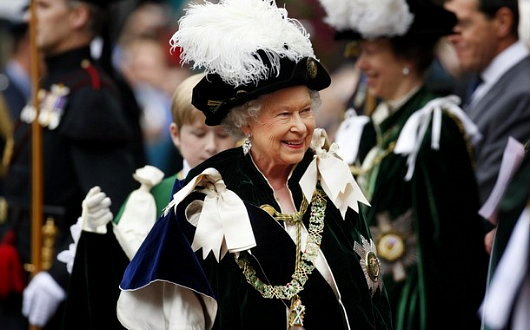
In 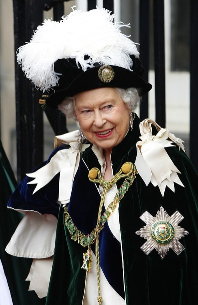 accordance with tradition, knights are appointed to the Order of the Thistle on the feast of Scotland’s patron saint, the Apostle Andrew, but they are not formally installed until the following summer when the Queen is in residence at the Palace of Holyroodhouse. And so this past July, the ‘Thistle Service’ took place at St. Giles’, the High Kirk of Edinburgh, and two new knights were inducted into Scotland’s highest honour and most exalted order of chivalry.
accordance with tradition, knights are appointed to the Order of the Thistle on the feast of Scotland’s patron saint, the Apostle Andrew, but they are not formally installed until the following summer when the Queen is in residence at the Palace of Holyroodhouse. And so this past July, the ‘Thistle Service’ took place at St. Giles’, the High Kirk of Edinburgh, and two new knights were inducted into Scotland’s highest honour and most exalted order of chivalry.
The knights, dames, and officers, dressed in their flowing velvet mantles of green along with their hats and collars, gather across Parliament Square in the Library of the Society of Writers to Her Majesty’s Signet (Scotland’s professional body of solicitors), part of the Parliament House complex that long ago housed the kingdom’s legislature, and is now home to her courts. In Parliament Square itself, the Royal Company of Archers (the Queen’s Body Guard for Scotland) forms a guard of honour and is accompanied by the band of the Royal Regiment of Scotland. (more…)
Douglas Murray: In Order to Prevent the Use of WMDs, We Must Use WMDs
The slightly camp Old Etonian atheist neo-con Douglas Murray got himself into a bit of trouble recently when he and Baroness Deech unleashed a splenetic rant against Scotland and the Scots on BBC Radio 4. As head of the HFEA, Baroness Deech presided over the deaths of an untold number of humans in the embryonic stage of development, but it turns out that Mr. Murray (who is Scottish-born, curiously) has advocated hypothetical wholesale slaughter.
In 2007, Mr. Murray helped compose Towards a Grand Strategy for an Uncertain World: Renewing Transatlantic Partnership ostensibly written by Gen. Dr. Klaus Naumann (former Bundeswehr Chief of Staff), Gen. Prince John Salikashvili (Georgian prince and former U.S. Chairman of the Joint Chiefs of Staff), Field Marshal the Lord Inge (former U.K. Chief of the General Staff), Adm. Jacques Lanxade (former Chief of the French Navy), and Gen. Henk van den Breemen (accomplished organist and former Chief of Staff of the Dutch military).
This interesting document made a number of recommendations, the most intriguing of which is the suggestion that NATO should be prepared to make a pre-emptive nuclear strike… in order to prevent the use of weapons of mass destruction (“WMDs”) such as, er, nuclear weapons. You read that correctly: in order to prevent the use of WMDs, NATO should be prepared to use WMDs. You couldn’t make it up!
dot Scot
Since 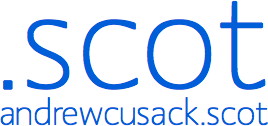 the decision by ICANN, the mysterious council of elders whose nomenclatory dominion spans, it seems, the entirety of the “world wide web”, to designate .cat as the “sponsored Top-Level Domain” of the Catalonian linguistic and cultural community, much speculation has arisen in various sub-statal lands throughout the world about future TLDs. In our favoured realm of Scotland, a campaign has arisen for .scot to be designated the TLD for Scotland. While I wholeheartedly support the campaign for a Scottish TLD, I have already expressed my reservations about the increasing size (not number) of TLDs. The traditional country-code TLDs are all two-letter combinations, and any new TLDs representing geographic entities ought to stick to this restraint.
the decision by ICANN, the mysterious council of elders whose nomenclatory dominion spans, it seems, the entirety of the “world wide web”, to designate .cat as the “sponsored Top-Level Domain” of the Catalonian linguistic and cultural community, much speculation has arisen in various sub-statal lands throughout the world about future TLDs. In our favoured realm of Scotland, a campaign has arisen for .scot to be designated the TLD for Scotland. While I wholeheartedly support the campaign for a Scottish TLD, I have already expressed my reservations about the increasing size (not number) of TLDs. The traditional country-code TLDs are all two-letter combinations, and any new TLDs representing geographic entities ought to stick to this restraint.
But then what would Scotland’s top-level domain be? .sl is taken by Sierra Leone, while .sc belongs to the Seychelles, and .st to São Tomé. We might hark back to the Gaelic with .al for Alba, except that it’s already occupied by Albania. Ah! Caledonia! How about .cd? Nope, that belongs to the Congo. Blast. It might be necessary to go to three letters then, which brings us either to .sco or .sct. Neither look all that attractive, though .sco has the advantage of being pronounceable. Actually, .sco is quite imaginable, when spoken: parliament.gov.sco, fifeherald.sco, glenfiddich.sco. It just doesn’t look right. .scot looks better, but the rhyming nature of “dot scot” is irritating to say aloud.
I do wish they’d make .gb available again. I’d much rather be a “gee-bee” than a “yoo-kay”. Great Britain is a natural entity, after all, whereas the United Kingdom is a government construct. Perhaps if the Union is re-negotiated, we might move from .uk to .gb, just as .yu was changed to .cs when Yugoslavia was renamed Serbia & Montenegro. (The two split not long afterwards, and went for .rs and .me).
With four letters, at least .scot is not the longest proposed top-level domain. Some ninny thinks there should be a .quebec — how cumbersome! .qu would be much better, and one can just imagine the Québécois pronouncing it. Other British proposals include .eng for England and .cym for Wales. “Norn Iron” loses out, as .ni belongs to Nicaragua, but .ul or .uls are conceivable for Ulster. Perhaps the Vatican could dole out .sre — Sancta Romana Ecclesia — for ecclesiastical domains.
Interesting Things Elsewhere
This determined Celt is gunning for Thabo
Kevin Bloom | The Daily Maverick
Ireland’s 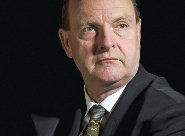 Paul O’Sullivan took over as head of security at South Africa’s airport authority in 2001, and discovered something was wrong from the start: why didn’t the policeman on duty want to take a statement about the attempted theft of his baggage? Since then, his life has been a series of bizarre events leading him ever deeper into the most complex criminal network of the post-apartheid era, including the recent the trial and conviction of former national police chief Jackie Selebi. But O’Sullivan’s determined quest to expose crookedness isn’t over yet, and he now has former president Thabo Mbeki in his sights. read more
Paul O’Sullivan took over as head of security at South Africa’s airport authority in 2001, and discovered something was wrong from the start: why didn’t the policeman on duty want to take a statement about the attempted theft of his baggage? Since then, his life has been a series of bizarre events leading him ever deeper into the most complex criminal network of the post-apartheid era, including the recent the trial and conviction of former national police chief Jackie Selebi. But O’Sullivan’s determined quest to expose crookedness isn’t over yet, and he now has former president Thabo Mbeki in his sights. read more
The apparatus of state will simply ignore the government
‘Inspector Gadget’ | Police Inspector Blog
Police across England were told by the responsible minister of the democratically elected government that they must not chase performance targets any longer. “I can also announce today that I am also scrapping the confidence target,” said the Home Secretary, Theresa May, “and the policing pledge with immediate effect”. But the ‘senior management team’ of the West Yorkshire Police have stated they will go on no matter what the government says. read more
Has Christian Democracy reached a dead end?
Jan-Werner Mueller | Guardian.co.uk
The commentator completes a brief survey of the struggles of Christian Democracy in Germany and Europe today. The French leader Georges Bidault claimed that Christian Democracy meant “to govern in the centre, and pursue, by the methods of the right, the policies of the left”. But Christian Democracy’s brief French moment in the 1950s didn’t survive the return of de Gaulle, and Christian Democratic parties on the continent today face an existential crisis. read more
Also: Monsignor Ignacio Barreiro’s talk at the Roman Forum’s 2010 Summer Symposium, entitled The Problem of Christian Democracy will be made available online in audio form sometime in the coming months.
Deep in Shanxi, the most Catholic village in China
Anthony E. Clark | Ignatius Insight
Church after church dot the landscape and high steeples rise above small villages as they do in southern France. Passing through a narrow side road one arrives and is welcomed by three great statues at the village entrance: St. Peter holding his keys is flanked by Saints Simon and Paul. Thirty minutes before Mass the village loudspeakers, once airing the revolutionary voice of Mao and Party slogans, now broadcasts the rosary. Welcome to Liuhecun, the most Catholic village in China. read more
Look for me in the Cotswolds.
Dino Marcantonio
The apologists for modernist architecture have tried for a century to gain public acceptance of and appreciation for their horrors. While the elites have almost overwhelmingly been converted, the general populace around the world still sees that the Emperor has no clothes, and almost always prefers architecture that reflects the tried and true, the local and the natural. Alain de Botton, the Swiss essayist, ‘pop philosopher’, and former ‘writer-in-residence’ at Heathrow Airport, is the latest to give it a go, this time in the pages of the modernist Architectural Record. Dino Marcantonio provides a most useful fisking. read more
Canada is a French country
Andrew Coyne | Maclean’s
At the recent Canada Day celebrations on Parliament Hill, Canadian PM Stephen Harper spoke of “the steadfast determination and continental ambition of our French pioneers, who were the first to call themselves ‘Canadians.’” At other times he has spoken of Canada as having been “born in French,” of French as “Canada’s first language,” and, most famously, of Quebec City as “Canada’s first city,” its founding in 1608 as marking “the founding of the Canadian state.” While the sentiment may seen anodyne, moreover, the implications are radical. read more
À bas l’Académie anglaise!
Proponents of an Academy of English are guilty of leaps of logic
IT STANDS AS one of the great monuments of autonomy and decentralisation that ever existed — the English language. But this great monument is under threat from an unlikely source: one sworn to defend it. The Queen’s English Society has announced plans to form an “Academy of English” along the lines of the Académie française for French or the Real Academia Española for Spanish.
“People misunderstand things if language is not used correctly,” argues Rhea Williams of the Queen’s English Society. “Misuse of apostrophes is the best-known problem, but people also don’t seem to know about tenses any more, for example, you hear ‘we was’ a lot.”
“An academy is needed because the correct information is not something that people can find easily. I suspect that many people in this country have easier access to a computer than to a reference book. They will be able to search without embarrassment, although people should be unafraid to say that they do not know what a word means.”
“At the moment, anything goes,” says Martin Estinel, the founder of the new academy. “Let’s set down a clear standard of what is good, correct, proper English. Let’s have a body to sit in judgment.”
No less an authority than Gerald Warner of Craiggenmaddie has waded into the debate, asserting on his Telegraph blog that “all champions of literacy will wish the society success.”
The complaints raised have a great deal of justification behind them, but the establishment of an academy does absolutely nothing to solve them. Indeed, the very complaint that the misuse of English is rampant and on the rise correctly presupposes that we are already able to discern proper English from improper English.
Rhea Williams and her confrers assume that when a person says “we was”, he is also claiming that it is right and proper English for him to say so. But, on the contrary, if you heard someone on the bus say “we was” and then inquired “Is that proper English?” he would almost certainly, if perhaps sheepishly, admit that it is not.
Similarly we hear complaints about “text speak”, as the shorthand version of English used in text messages (also known as SMSs) is called. But text speak similarly makes no claims to being acceptable as proper English. None would dream of preparing a job application, for example, in text speak.
Furthermore, the Queen’s English Society does not even use proper English on its website.
The Society aims to start using its BLOG [sic] again, following a period of inactivity. If you have something to say about the English language, in the context of education, employment, the media and feel able to contribute to the debate, we invite selected guest bloggers to send in their blogs.
“Blog” is a contraction of “web log” which has rapidly achieved legitimacy, and refers to the entirety of a blog, but the QES almost certainly used the word “blog” instead of what they actually meant, “blog entries”.
The very word “blog” itself is a perfect example of the threat to English that establishing an academy poses. I dislike the word myself, but its usefulness is inescapable. We needn’t refer to that wide and varying array of websites which are in fact an agglomeration of personal writings and links to other items of note — we can simply say “blogs”. An English Academy, on the other hand, might have banished “blog” from its fatuous version of what constitutes proper English early on, in which case the language would be all the poorer, or at least all the more cumbersome.
English speakers know good use from poor use, and when they’re not sure they overwhelmingly defer to those who do know. An Academy of English would do more harm than good and would solve none of the problems that would provoke its foundation. A massive and broad-based information campaign, on the other hand, paired with the return of authoritative teaching in schools, would aid the better use of English infinitely more than a body of pedants to settle disputes that do not exist. Pressure must be exercised against broadcasters, who spread improper English through a misguided attempt at authenticity, and we must also challenge the widespread perception of a social bias against proper speaking.
All these things can be done without any academy, and indeed establishing one would take energy away from these efforts. I’m sure therefore that, pace Mr. Warner, all champions of literacy will join me in shouting “À bas l’Académie anglaise!”
Search
Instagram: @andcusack
Click here for my Instagram photos.Most Recent Posts
- Faithful Shepherd of the Falklands April 8, 2025
- Articles of Note: 8 April 2025 April 8, 2025
- Proportionality Destroys Representation April 8, 2025
- Sag Harbor Cinema March 26, 2025
- Teutonic Takeover March 10, 2025
Most Recent Comments
Book Wishlist
Monthly Archives
Categories


